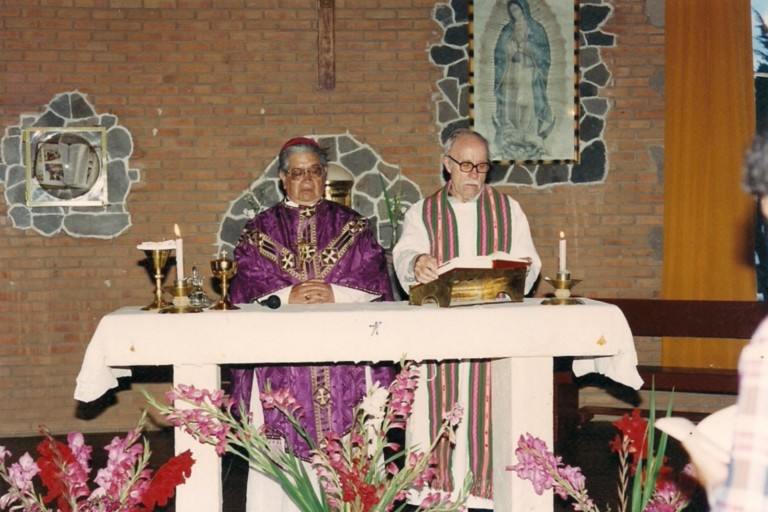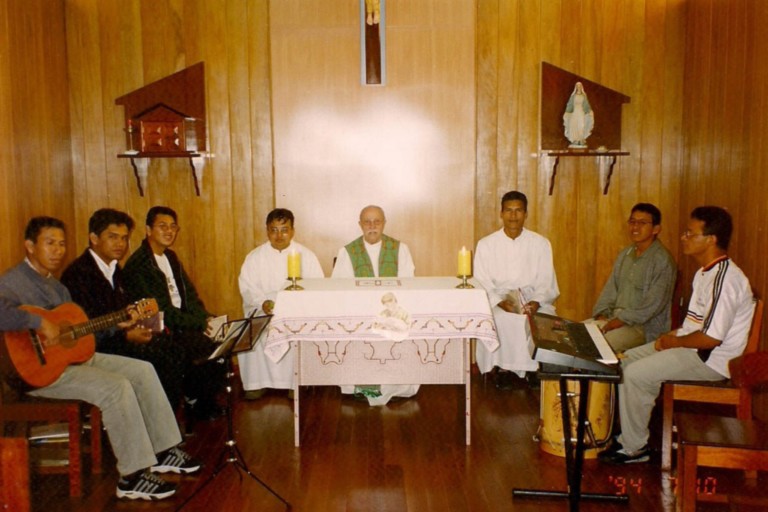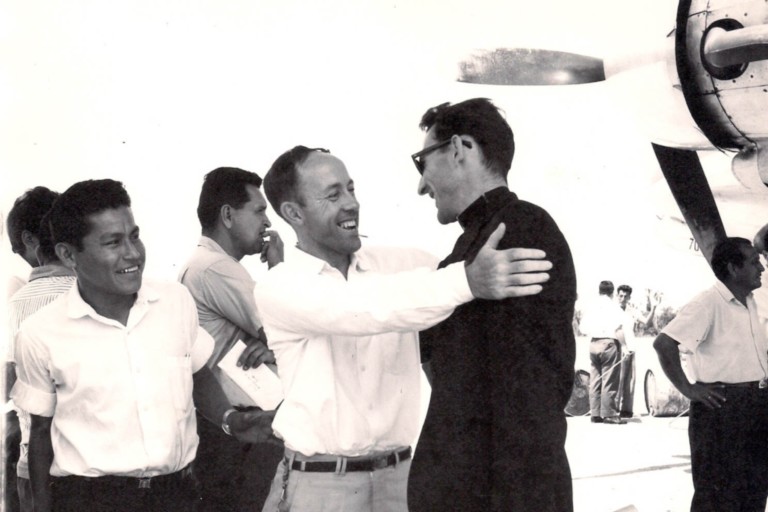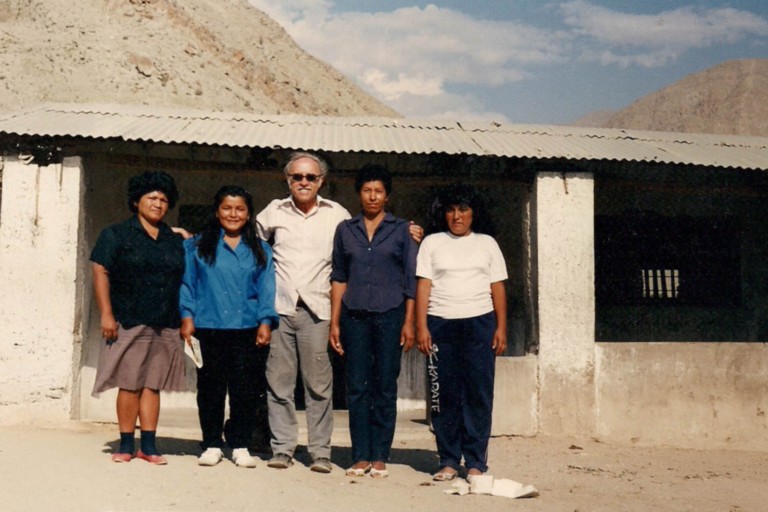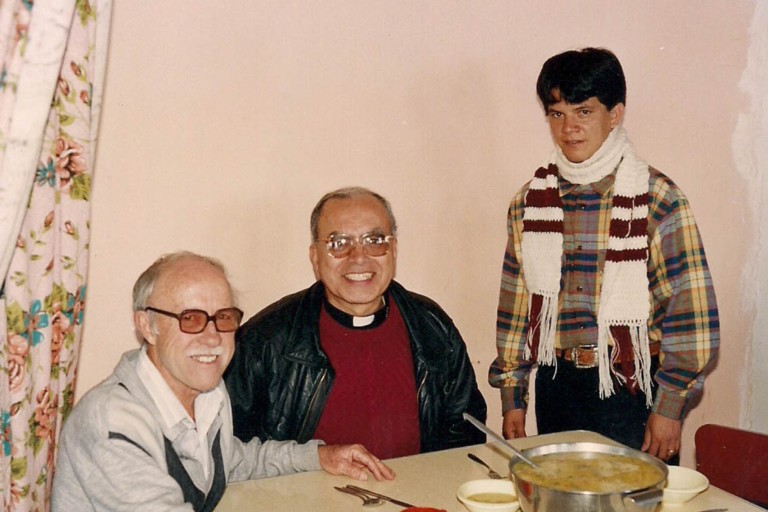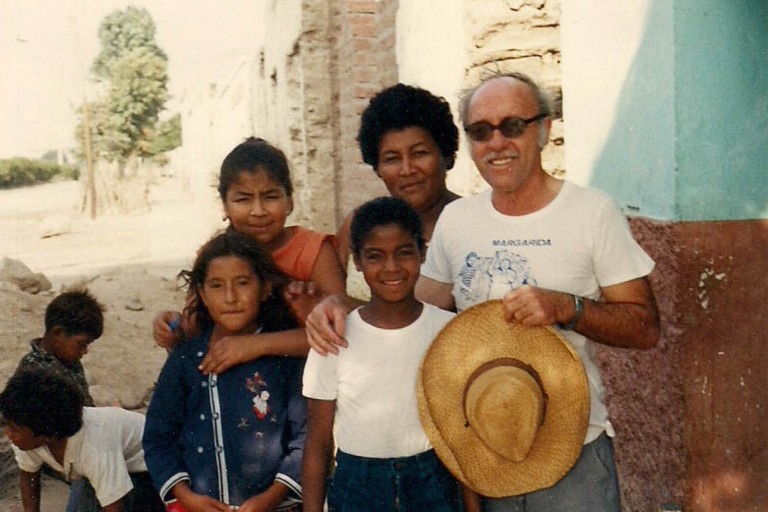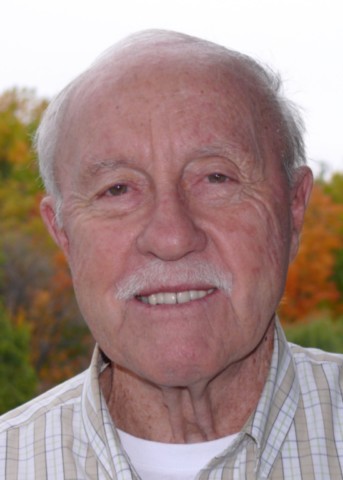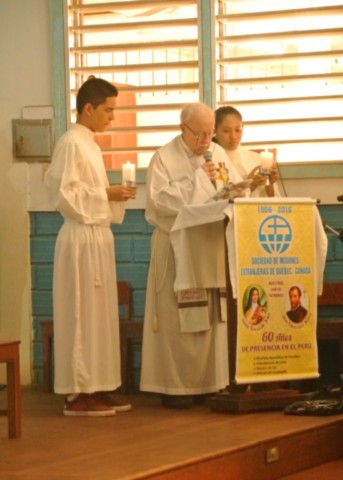Florencio Dubé and the Tent of Meeting
The symbol of the tent is a central element in the Word of God and in the life of a missionary. For Florencio Dubé (born Floricien Dubé Baril), it’s no different. In the Bible, after being freed from slavery in Egypt, God manifested himself in a close, profound, and constant way in the “Tent of Meeting,” where the tribes gathered to refocus on their shared project of becoming a united people centered on the Lord who guided them (Exodus 33).
Throughout his ministry, Florencio was a gatherer, like Moses in some ways, through his leadership and longevity. He united people around the Word, the Eucharist, and service to the most vulnerable—a man always on the move.
In his homily during the Thanksgiving Mass for his ministry on May 25, 2025, Florencio began with an anecdote. When he arrived in Ica with his mission companion—then a lay missionary—Bernard Duquette (now a member of the Quebec Foreign Mission Society), the village children shouted, “The circus has arrived!” They wondered among themselves: “Are we the clowns?”
Florencio, affectionately nicknamed “Flo,” was often seen riding his motorcycle and became a hero to the most exploited. At age 95, he has decided to return to Canada. Born in Quebec and a member of the Quebec Foreign Mission Society (Société des Missions Étrangères - SMÉ), this “liberation priest” didn’t just hand out essentials for survival—above all, he was a passionate defender of the rights of children, male and female farmers, workers, and more.
From the working-class neighborhoods of Ica (San Joaquín Urbanization) to the rural communities of San Juan Bautista and San José de Los Molinos, Florencio offered more than just Masses and sacraments: he drilled wells to irrigate the land of small farmers, supported union organizing, and led grassroots mobilizations to fight injustice and corruption at every political level.
With humor and empathy, he accompanied generations of young people on the path toward a more just and equitable Peru. A true pisco enthusiast (Ica is a renowned wine and pisco-producing region), his life was a vibrant testimony to the preferential option for the poor, weaving deep friendships throughout the country and beyond.
Today, after seven decades of missionary service in Peru, he returns to his homeland, leaving behind a vast legacy of love, gratitude, and faith.
The children of San Juan weren’t entirely wrong to think the circus had arrived. But they received a tent far more beautiful than any circus tent: first, the reconstruction of the colonial church (whose roof had collapsed); a new parish house where people loved to gather and sing; a library for high school students with essential books; rooms for youth and adult formation (music, theater, catechesis, film screenings, etc.). In short, a vast human and spiritual tent that brought them deep joy, a renewed sense of meaning in life, and the awareness of the Kingdom of God present among their people.
Quebec awaits him with joy and gratitude, while in Lima and throughout Peru, his departure will undoubtedly leave joyful memories and a desire to continue on the path he paved through so much love sown during his missionary life.
The people he served say to him: “To you, Flo, thank you for lighting up our hearts with your missionary light… and your unforgettable motorcycle!”
Some Highlights of His Ministry in Peru:
- Support for young shoeshiners: meals, supplies, and union organizing
- Denounced municipal abuses and fostered respect and social acceptance for these working children
San Joaquín Parish (Ica):
- Developed a youth ministry known as “the open door ministry”
- United grassroots organizations
San Juan Bautista:
- Built a shared home with Bernard Duquette and young men like Alejandro Mazuelos, Javier Arroyo, and others
- Practical work: well drilling, support for agricultural cooperatives (Tacama, Chavalina, Trapiche, etc.)
- Pastoral team with Dominican Sister Madre Sofía (catechist formation), later joined by two Carmelite missionary sisters, Estela and Lucía—extraordinary women!
- Municipal initiatives: access to drinking water and electrification (purchase of a central generator)
San José de Los Molinos:
- Lived with the Arroyo Huamán family, who became his chosen family
- Youth formation
- Support for farmers’ associations
Chincha Baja:
- Transferred due to health reasons (sun exposure)
- Continued pastoral work with rural youth (JARC)
Lima:
- Lived in community with associated lay missionaries
- Ministry at the Capilla de Viator Boucher
- Work with youth in poor neighborhoods and in prison ministry, especially at Maranguita (youth detention center)
Personal Traits:
- Joyful man, full of humor, and a lover of Peruvian pisco
- Tireless defender of farmers and dynamic youth leader
International Engagement:
- Accompanied Catholic Rural Youth (JARC)
- Participated in international gatherings (MIJARC in Europe) and the World Forum (Nairobi, Kenya)
